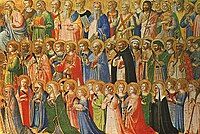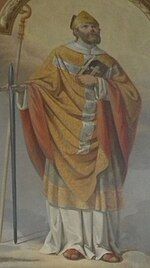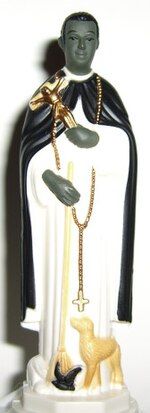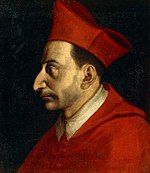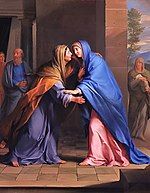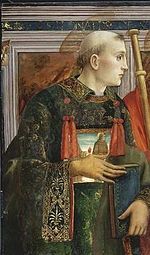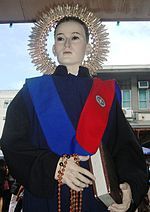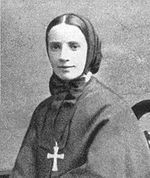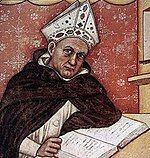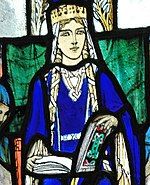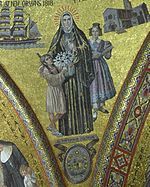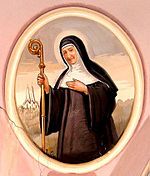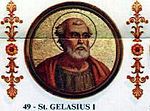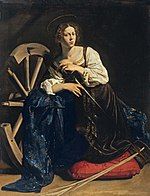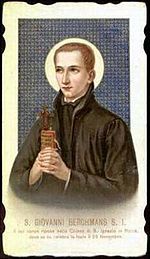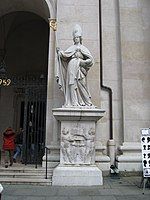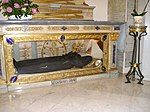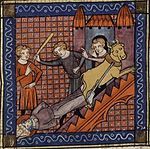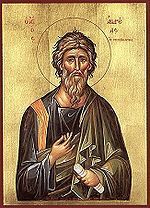Portal:Catholic Church/Patron Archive/November
Patron Archive
January - February - March - April - May - June - July - August - September - October - November - December
Today is Wednesday, December 4, 2024; it is now 03:58 UTC
All Saints' Day, also known as All Hallows' Day, the Feast of All Saints, the Feast of All Hallows, the Solemnity of All Saints, and Hallowmas, is a Christian solemnity celebrated in honour of all the saints of the Church, whether they are known or unknown. (Full article...)
Attributes: -
Patronage: -
Saint Victorinus of Pettau (also Ptuj or Poetovio; Greek: Βικτωρίνος Πεταβίου; died 303 or 304) was an Early Christian ecclesiastical writer who flourished about 270, and who was martyred during the persecutions of Emperor Diocletian. A Bishop of Poetovio (modern Ptuj in Slovenia; German: Pettau) in Pannonia, Victorinus is also known as Victorinus Petavionensis or Poetovionensis. Victorinus composed commentaries on various texts within the Christians' Holy Scriptures. (Full article...)
Attributes: Palm, pontifical vestments
Patronage: -
Martín de Porres Velázquez OP (9 December 1579 – 3 November 1639) was a Peruvian lay brother of the Dominican Order who was beatified in 1837 by Pope Gregory XVI and canonized in 1962 by Pope John XXIII. He is the patron saint of mixed-race people, barbers, innkeepers, public health workers, all those seeking racial harmony, and animals.
He was noted for his work on behalf of the poor, establishing an orphanage and a children's hospital. He maintained an austere lifestyle, which included fasting and abstaining from meat. Among the many miracles attributed to him were those of levitation, bilocation, miraculous knowledge, instantaneous cures, and an ability to communicate with animals. (Full article...)
Attributes: a dog, a cat, a bird, and a mouse eating together from a same dish; broom, crucifix, rosary, a heart
Patronage: Diocese of Biloxi, Vietnam, Mississippi, black people, hair stylists, innkeepers, lottery, lottery winners, mixed-race people, Peru, poor people, public education, public health, public schools, race relations, social justice, state schools, television, Mexico, Peruvian Naval Aviators
Charles Borromeo (Italian: Carlo Borromeo; Latin: Carolus Borromeus; 2 October 1538 – 3 November 1584) was an Italian Catholic prelate who served as Archbishop of Milan from 1564 to 1584. He was made a cardinal in 1560. (Full article...)
Attributes: cord, red cardinal robes
Patronage: against ulcers; apple orchards; bishops; catechists; catechumens; colic; intestinal disorders; Lombardy, Italy; Monterey California; seminarians; spiritual directors; spiritual leaders; starch makers; stomach diseases; São Carlos city in Brazil
Prayer: O Saintly reformer, animator of spiritual renewal of priests and religious, you organized true seminaries and wrote a standard catechism. Inspire all religious teachers and authors of catechetical books. Move them to love and transmit only that which can form true followers of the Teacher who was divine. Amen.
Elizabeth (also spelled Elisabeth; Hebrew: אֱלִישֶׁבַע "My God is abundance", Standard Hebrew: Elišévaʿ, Tiberian Hebrew: ʾĔlîšéḇaʿ; Greek: Ἐλισάβετ Elisabet / Elisavet) was the mother of John the Baptist, the wife of Zechariah and a relative of Mary, mother of Jesus, according to the Gospel of Luke and in Islamic tradition. She was past normal child-bearing age when she conceived and gave birth to John. (Full article...)
Attributes: -
Patronage: Pregnant women
See also: Guido Maria Conforti
Leonard of Noblac (also Leonard of Limoges or Leonard of Noblet; also known as Lienard, Linhart, Lenart, Leonhard, Léonard, Leonardo, Annard; died 559) is a Frankish saint closely associated with the town and abbey of Saint-Léonard-de-Noblat, in Haute-Vienne, in the Limousin region of France. He was converted to Christianity along with the king, at Christmas 496. Leonard became a hermit in the forest of Limousin, where he gathered a number of followers. Leonard or Lienard became one of the most venerated saints of the late Middle Ages. His intercession was credited with miracles for the release of prisoners, women in labour and the diseases of cattle. (Full article...)
Attributes: depicted as an abbot holding chains, fetters or locks, or manacles
Patronage: political prisoners, imprisoned people, prisoners of war, and captives, women in labor, as well as horses
See also: Paul I of Constantinople
Vicente Liêm of Peace (Spanish: Vicente Liêm de la Paz) (Vietnamese: Vinh Sơn Hòa Bình) or Vinh Sơn Phạm Hiếu Liêm (1732 – 7 November 1773) was a Tonkinese (present day northern Vietnam) Dominican friar venerated as a saint and martyr by the Catholic Church along with other Vietnamese Martyrs in 1988. (Full article...)
Attributes: book, palm, hood, rosary, academic birreta, dalmatic
Patronage: Tonkin, Colegio de San Juan de Letran, Students of Letran
See also: Francisco Palau, Vincenzo Grossi
Elizabeth of the Trinity, OCD (French: Élisabeth de la Trinité), born Élisabeth Catez (18 July 1880 – 9 November 1906), was a French Discalced Carmelite, a mystic, and a spiritual writer. She was known for the depth of her spiritual growth as a Carmelite as well as bleak periods in which her religious calling was perceived to be unsure according to those around her; she however was acknowledged for her persistence in pursuing the will of God and in devoting herself to the charism of the Carmelites.
Elizabeth was a gifted pianist and had strong feelings for the Carmelite charism. Of that experience as a professed religious she wrote in a letter: "I can't find words to express my happiness. Here there is no longer anything but God. He is All; He suffices and we live by Him alone" (Letter 91). (Full article...)
Attributes: Religious habit
Patronage: Sick people; Loss of parents; Against illness
See also: Pope Adeodatus I; Willehad; Gervadius; Four Crowned Martyrs
Benignus of Armagh (died 467) was the son of Sesenen, an Irish chieftain in the part of Ireland that is now called County Meath. (Full article...)
Attributes: -
Patronage: -
Andrew (Andrea) Avellino (1521 – 10 November 1608) was an Italian Theatine priest. He is venerated as the patron saint of Naples and Sicily and invoked especially against a sudden death. He led a life busy in preaching, hearing confessions, and visiting the sick, and writing. (Full article...)
Attributes: -
Patronage: Naples, Sicily; invoked against sudden death
See also: Pope Leo I; Adelin of Séez, France; Lübeck martyrs, Germany
Saint Martin of Tours (Latin: Martinus Turonensis; 316/336 – 8 November 397), also known as Martin the Merciful, was the third bishop of Tours. He has become one of the most familiar and recognizable saints in France, heralded as the patron saint of the Third Republic. He is the patron saint of many communities and organizations across Europe. A native of Pannonia (in present-day Hungary), he converted to Christianity at a young age. He served in the Roman cavalry in Gaul, but left military service at some point prior to 361, when he became a disciple of Hilary of Poitiers, establishing the monastery at Ligugé. He was consecrated as Bishop of Caesarodunum (Tours) in 371. As bishop, he was active in the suppression of the remnants of Gallo-Roman religion, but he opposed the violent persecution of the Priscillianist sect of ascetics. (Full article...)
Attributes: man on horseback sharing his cloak with a beggar; man cutting cloak in half; globe of fire; goose
Patronage: against poverty; against alcoholism; Baħrija, Malta; beggars; Beli Manastir; Archdiocese of Bratislava; Buenos Aires; Burgenland; cavalry; Church Lads' and Church Girls' Brigade; Dieburg; Edingen equestrians; Foiano della Chiana; France; geese; horses; hotel-keepers; innkeepers; Kortrijk; diocese of Mainz; Montemagno; Olpe; Ourense; Pietrasanta; Pontifical Swiss Guards; quartermasters; reformed alcoholics; riders; Taal, Batangas; Bocaue, Bulacan; Diocese of Rottenburg-Stuttgart; soldiers; tailors; Utrecht; vintners; Virje; wine growers; wine makers; Wissmannsdorf and Villadoz
Josaphat Kuntsevych, OSBM (c. 1580 – 12 November 1623) was a Basilian hieromonk and archeparch of the Ruthenian Uniate Church who served as Archbishop of Polotsk from 1618 to 1623. On 12 November 1623, he was beaten to death with an axe during an anti-Catholic riot by Eastern Orthodox Belarusians in Vitebsk, in the eastern peripheries of the Polish–Lithuanian Commonwealth. (Full article...)
Attributes: -
Patronage: Ukraine; Polish parishes in the United States, most notably among them are the Basilica of St. Josaphat, in Milwaukee, Wisconsin and St Josaphat's parish in Chicago, Illinois.
Frances Xavier Cabrini MSC (Italian: Francesca Saverio Cabrini (birth name), July 15, 1850 – December 22, 1917), also known as Mother Cabrini, was an Italian-American, Catholic, religious sister (nun). She founded the Missionary Sisters of the Sacred Heart of Jesus, a religious institute that was a major support to her fellow Italian immigrants in the United States. Her congregation provided education, health care, and other services to the poor. (Full article...)
Attributes: -
Patronage: immigrants, hospital administrators
See also: Abbo of Fleury, France; Agostina Livia Pietrantoni
Lorcán Ua Tuathail, known in English as Laurence O'Toole and in French as Laurent d'Eu (1128 – 14 November 1180), was Archbishop of Dublin at the time of the Norman invasion of Ireland. Lorcán played a prominent role in the Irish Church Reform Movement of the 12th century and mediated between the parties during and after the invasion. He was canonised in 1225 by Pope Honorius III. (Full article...)
Attributes: -
Patronage: Archdiocese of Dublin
See also: Nicholas Tavelic, Croatia; Joseph Pignatelli, Spain
Albertus Magnus OP (c. 1200 – 15 November 1280), also known as Saint Albert the Great, Albert of Swabia
or Albert of Cologne, was a German Dominican friar, philosopher, scientist, and bishop, considered one of the greatest medieval philosophers and thinkers. (Full article...)
Attributes: -
Patronage: medical technicians; natural sciences; philosophers; scientists; students; World Youth Day; Cincinnati, Ohio
Saint Margaret of Scotland (Scottish Gaelic: Naomh Maighréad; Scots: Saunt Marget, c. 1045 – 16 November 1093), also known as Margaret of Wessex, was Queen of Alba from 1070 to 1093 as the wife of King Malcolm III. Margaret was sometimes called "The Pearl of Scotland". She was a member of the House of Wessex and was born in the Kingdom of Hungary to the expatriate English prince Edward the Exile. She and her family returned to England in 1057. Following the death of Harold Godwinson at the Battle of Hastings in 1066, her brother Edgar Ætheling was elected as King of England but never crowned. After the family fled north, Margaret married Malcolm III of Scotland by the end of 1070. (Full article...)
Attributes: queen, reading
Patronage: Scotland, Dunfermline, Fife, Shetland, The Queen's Ferry, and Anglo-Scottish relations
See also: Gertrude the Great, Germany; Giuseppe Moscati, Italy; Roque González y de Santa Cruz, Peru
Elizabeth of Hungary (German: Heilige Elisabeth von Thüringen, Hungarian: Árpád-házi Szent Erzsébet, Slovak: Svätá Alžbeta Uhorská; 7 July 1207 – 17 November 1231), also known as Elisabeth of Thuringia, was a princess of the Kingdom of Hungary and the landgravine of Thuringia.
Elizabeth was married at the age of 14, and widowed at 20. After her husband's death, she regained her dowry, using the money to build a hospital where she herself served the sick. She became a symbol of Christian charity after her death in 1231 at the age of 24 and was canonized on 25 May 1235. She is venerated as a saint by the Catholic Church. She was an early member of the Third Order of St. Francis, and is today honored as its patroness. (Full article...)
Attributes: Crown, roses, tending to beggars
Patronage: hospitals, nurses, bakers, brides, countesses, dying children, exiles, homeless people, lace-makers, widows, Roman Catholic Archdiocese of Jaro and the Third Order of Saint Francis
See also: Saint Afan, Wales; Juan de Castillo, Spain
Rose Philippine Duchesne, RSCJ (French pronunciation: [ʁoz filipin dyʃɛn]; August 29, 1769 – November 18, 1852), was a French religious sister and educator whom Pope John Paul II canonized in 1988. A native of France, she immigrated as a missionary to America, and is recognized for her care and education of Indigenous American survivors of the United States Indian removal programs.
Along with the founder, Madeleine-Sophie Barat, Duchesne was an early member of the Society of the Sacred Heart and established the congregation's first communities in the United States. She spent the last half of her life teaching and serving the people of the Midwestern United States, which was at that time considered the western frontier of the nation. (Full article...)
Attributes: -
Patronage: perseverance amid adversity, Diocese of Springfield-Cape Girardeau
Mechthild is a female Germanic given name. It is an old form of the first name Matilda and means "powerful in combat, powerful fighter".
Variants include Mechthilde, Mechthildis, Mechtild, Mechtilde or Mechtildis. (Full article...)
Attributes: Scales and a sword, heart, book and dove
Patronage: Against blindness
See also: Raphael Kalinowski
Edmund the Martyr (also known as St Edmund or Edmund of East Anglia, died 20 November 869) was king of East Anglia from about 855 until his death.
Few historical facts about Edmund are known, as the kingdom of East Anglia was devastated by the Vikings, who destroyed any contemporary evidence of his reign. Coins minted by Edmund indicate that he succeeded Æthelweard of East Anglia, as they shared the same moneyers. He is thought to have been of East Anglian origin, but 12th century writers produced fictitious accounts of his family, succession and his rule as king. Edmund's death was mentioned in the Anglo-Saxon Chronicle, which relates that he was killed in 869 after the Great Heathen Army advanced into East Anglia. Medieval versions of Edmund's life and martyrdom differ as to whether he died in battle fighting the Great Heathen Army, or if he met his death after being captured and then refusing the Viking leaders' demand that he renounce Christ. (Full article...)
Attributes: Crowned and robed king holding a scepter, orb, arrow, or a sword; wolf; severed head
Patronage: Kings; pandemics; the Roman Catholic diocese of East Anglia; Douai Abbey; the English County of Suffolk; wolves, torture victims, protection from the plague
Pope Gelasius I was the bishop of Rome from 1 March 492 to his death on 19 November 496. Gelasius was a prolific author whose style placed him on the cusp between Late Antiquity and the Early Middle Ages. Some scholars have argued that his predecessor Felix III may have employed him to draft papal documents, although this is not certain. (Full article...)
Attributes: -
Patronage: -
Saint Cecilia (Latin: Sancta Caecilia), also spelled Cecelia, was a Roman Christian virgin martyr, who is venerated in Catholic, Orthodox, Anglican, and some Lutheran churches, such as the Church of Sweden. She became the patroness of music and musicians, it being written that, as the musicians played at her wedding, Cecilia "sang in her heart to the Lord". Musical compositions are dedicated to her, and her feast, on 22 November, is the occasion of concerts and musical festivals. She is also known as Cecilia of Rome. (Full article...)
Prayer: Dear Saint Cecilia, one thing we know for certain about you is that you became a heroic martyr in fidelity to your divine Bridegroom. We do not know that you were a musician but we are told that you heard Angels sing. Inspire musicians to gladden the hearts of people by filling the air with God's gift of music and reminding them of the divine Musician who created all beauty. Amen.
Attributes: Flute, organ, roses, violin, harp, Baritone harpsichord, singing
Patronage: Hymns, musicians, poets; Albi, France; Archdiocese of Omaha, Nebraska; Mar del Plata, Argentina, Pipe organs
Clement of Rome (Latin: Clemens Romanus; Ancient Greek: Κλήμης Ῥώμης, romanized: Klēmēs Rōmēs; died c. 100 AD), also known as Pope Clement I, was the bishop of Rome in the late first century AD. He is considered to be the first of the Apostolic Fathers of the Church, and a leading member of the Church in Rome in the late 1st century.
Little is known about Clement's life. Tertullian claimed that Clement was ordained by Saint Peter. Early church lists place him as the second or third bishop of Rome. Eusebius, in his book Church History mentioned Clement as the third bishop of Rome and as the "co-laborer" of Paul. In Against Heresies, Irenaeus describes Clement as the successor to Anacletus (third bishop of Rome), and a personal acquaintance of the Apostles. According to the Annuario Pontificio, Clement was the fourth bishop of Rome, holding office at the very end of the 1st century. It is likely that Clement died in exile, and was possibly martyred. According to apocryphal stories dating back to the 4th century by authors such as Rufinus, Clement was imprisoned by Roman Emperor Trajan, and was executed by being tied to an anchor and thrown into the sea. The Liber Pontificalis states that Clement died in Greece in the third year of Trajan's reign, or 100 AD. (Full article...)
Attributes: Papal vestments; mariner's cross; anchor tied to the side; palm of martyrdom
Patronage: Angono, Rizal; mariners; stone-cutters
See also: Columbanus, Ireland
Vietnamese Martyrs (Vietnamese: Các Thánh Tử đạo Việt Nam), also known as the Martyrs of Tonkin and Cochinchina, collectively Martyrs of Annam or formerly Martyrs of Indochina, are saints of the Catholic Church who were canonized by Pope John Paul II. On June 19, 1988, thousands of overseas Vietnamese worldwide gathered at St. Peter's Square for the celebration of the canonization of 117 Vietnamese Martyrs, an event organized by Monsignor Trần Văn Hoài. Their memorial in the current General Roman Calendar is on November 24 as Saint Andrew Dung-Lac and Companions (Vietnamese: Anrê Dũng-Lạc và các bạn tử đạo), although many of these saints have a second memorial, having been beatified and inscribed on the local calendar prior to the canonization of the group. (Full article...)
Attributes: -
Patronage: Vietnam
See also: Andrew Dũng-Lạc, Vietnam, Théophane Vénard
Catherine of Alexandria, also spelled Katherine (Greek: Αίκατερίνη) is, according to tradition, a Christian saint and virgin, who was martyred in the early 4th century at the hands of the emperor Maxentius. According to her hagiography, she was both a princess and a noted scholar who became a Christian around age 14, converted hundreds of people to Christianity, and was martyred around age 18. More than 1,100 years after Catherine's martyrdom, Joan of Arc identified her as one of the saints who appeared to and counselled her. (Full article...)
Attributes: the "breaking wheel"; sword; with a crown at her feet; hailstones; bridal veil and ring; dove; scourge; book; woman arguing with pagan philosophers
Patronage: apologists, craftsmen who work with a wheel (potters, spinners, etc.), archivists, dying people, educators, girls, jurists, knife sharpeners, lawyers, librarians, libraries, Balliol College, maidens, mechanics, millers, nurses, philosophers, preachers, scholars, schoolchildren, scribes, secretaries, spinsters, stenographers, students, tanners, teachers, theologians, University of Paris, unmarried girls, haberdashers, wheelwrights, Żejtun, Żurrieq
John Berchmans, SJ (Dutch: Jan Berchmans [jɑm ˈbɛr(ə)xmɑns]; 13 March 1599 – 13 August 1621) was a Belgian Jesuit scholastic and is revered as a saint in the Catholic Church.
In 1615, the Jesuits opened a college at Mechelen, Belgium and Berchmans was one of the first to enroll. His spiritual model was his fellow Jesuit Aloysius Gonzaga, and he was influenced by the example of the English Jesuit martyrs. Berchmans is the patron saint of altar servers, Jesuit scholastics, and students. (Full article...)
Attributes: Often depicted with hands clasped, holding his crucifix, his book of rules, and his rosary
Patronage: Altar Servers, Jesuit scholastics, and students
See also: Leonard of Port Maurice
Virgil (c. 700– 27 November 784), also spelled Vergil, Vergilius, Virgilius, Feirgil or Fearghal, was an Irish priest and early astronomer. He left Ireland around 745, intending to visit the Holy Land; but, like many of his countrymen, he settled in Francia. Virgil served as abbot of Aghaboe, bishop of Ossory and later bishop of Salzburg. He was called "the Apostle of Carinthia" and "the geometer". (Full article...)
Attributes: -
Patronage: -
See also: Saint Congar, England; Humilis of Bisignano; Leonard of Port Maurice
Catherine Labouré, DC (May 2, 1806 – December 31, 1876) was a French member of the Daughters of Charity of Saint Vincent de Paul and a Marian visionary. She is believed to have relayed the request from the Blessed Virgin Mary to create the Miraculous Medal, now worn by millions of people around the world. Labouré spent forty years caring for the aged and infirm. For this, she is called the patroness of seniors. (Full article...)
Attributes: Daughters of Charity habit, Miraculous Medal
Patronage: Miraculous Medal, infirmed people, the elderly
Saturnin of Toulouse (Latin: Saturninus, Occitan: Sarnin, French: Saturnin, Sernin, Catalan: Serni, Sadurní, Galician: Sadurninho and Portuguese: Saturnino, Sadurninho, Basque: Satordi, Saturdi, Zernin, and Spanish: Saturnino, Serenín, Cernín) was one of the "Apostles to the Gauls" sent out (probably under the direction of Pope Fabian, 236–250) during the consulate of Decius and Gratus (250–251) to Christianise Gaul after the persecutions under Emperor Decius had all but dissolved the small Christian communities. Fabian sent out seven bishops from Rome to Gaul to preach the Gospel: Gatien to Tours, Trophimus to Arles, Paul to Narbonne, Saturnin to Toulouse, Denis to Paris, Austromoine to Clermont, and Martial to Limoges. His feast day is 29 November. (Full article...)
Attributes: A bishop's mitre, a bishop being dragged by a bull, a bull
Patronage: Toulouse, France
See also: Francis Fasani
Andrew the Apostle (Koinē Greek: Ἀνδρέας, romanized: Andréas [anˈdre.aːs̠]; Latin: Andreas [än̪ˈd̪reː.äːs]; Aramaic: אַנדּרֵאוָס; Classical Syriac: ܐܰܢܕ݁ܪܶܐܘܳܣ, romanized: ʾAnd'raʾwās), also called Saint Andrew, was an apostle of Jesus. According to the New Testament, he was a fisherman and one of the Twelve Apostles chosen by Jesus. The title First-Called (Πρωτόκλητος, Prōtoklētos) stems from the Gospel of John, where Andrew, initially a disciple of John the Baptist, follows Jesus and, recognizing him as the Messiah, introduces his brother Simon Peter to him.
According to Eastern Orthodox tradition, the apostolic successor to Andrew is the Patriarch of Constantinople. (Full article...)
Attributes: Old man with long white hair and beard, holding the Gospel Book or scroll, sometimes leaning on a saltire, fishing net
Patronage: Scotland, Barbados, Georgia, Ukraine, Russia, Greece, Cyprus, Romania, Patras, Burgundy, San Andrés (Tenerife), Diocese of Parañaque, Telhado, Sarzana, Amalfi, Luqa (Malta) and Prussia; Diocese of Victoria; fishermen, fishmongers and rope-makers, textile workers, singers, miners, pregnant women, butchers, farm workers, protection against sore throats, protection against convulsions, protection against fever, protection against whooping cough

